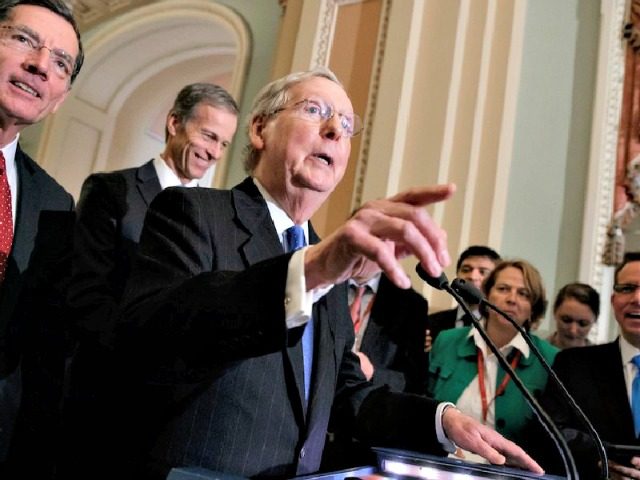The Senate will take up health care reform after a revised version of the American Health Care Act (AHCA) passed through the House last Thursday.
Senate Majority Leader Mitch McConnell (R-KY) said Saturday that the Senate does not expect help from Democrats as it works to repeal and replace Obamacare.
“We don’t anticipate any Democratic help at all so that it will be a simple majority vote situation,” McConnell told the Associated Press.
Several senators expressed concern over the House decision to vote without a Congressional Budget Office (CBO) score.
Senator Roy Blunt (R-MO), a member of Senate leadership, said that the Senate will wait for a new CBO score before preceding to a vote.
Senate Republicans already plan to change the House version of the AHCA.
Mick Mulvaney, head of the Office of Management and Budget, said, “The bill that passed out of the House is most likely not going to be the bill that is put in front of the president.”
White House chief of staff Reince Priebus spoke with a dozen members of a Senate working to make “improvements” to the bill, necessary to win at least 50 votes to pass through the Senate. Members of the working group include Sens. Mitch McConnell, Bob Portman (R-OH), John Corynyn (R-TX), John Thune (R-SD), Mike Enzi (R-WY), Orrin Hatch (R-UT), Lamar Alexander (R-TN), Tom Cotton (R-AR), Cory Gardner (R-CO), Ted Cruz (R-TX), John Barrasso (R-WY), and Pat Toomey (R-PA).
“Everyone is committed to getting this thing done and getting it done as soon as possible. I don’t think everyone is going to be beating down this group of 12; I think we’re going to want to let them do their work,” Priebus told Fox News.
The Senate working group does not feature two of the bill’s biggest critics, Senators Susan Collins (R-ME) and Bill Cassidy (R-LA). The two senators joined a separate group of Republicans studying potential health care solutions including Sens. Shelley Moore Capito (R-WV), Johnny Isakson (R-GA), and Mike Rounds (R-SD).
Senators Cassidy and Collins released a separate Obamacare repeal bill, The Patient Freedom Act. The bill would repeal the individual and employer mandate for health insurance, retain protections for pre-existing conditions, and allow young adults to stay on their parents’ health plan until age 26. States have three options under the Cassidy-Collins plan:
- Retain the Affordable Care Act, allowing individuals and small businesses able to purchase insurance on state exchanges and low-income residents can receive federal subsidies to cover the cost of the program. States that expanded Medicaid can continue to provide increased Medicaid coverage.
- States can receive most of the federal funding, including Medicaid expansion and subsidies to create tax-free Health Savings Accounts for low-income citizens. Low-income residents can use the HSAs to purchase insurance and pay for health care.
- Allow states to create an alternative solution without federal assistance. States would retain the power to design and regulate insurance markets without federal intervention.
Congressman Mark Meadows (R-NC), chairman of the House Freedom Caucus, told Breitbart News that he will work with Senate colleagues to push for a more conservative version. “I am having conversations with my colleagues in the Senate,” he explained, “where we can push for even more conservative solutions because it was more difficult to push amendments procedurally in the House.”
Senators Rand Paul (R-KY), Mike Lee (R-UT), and Ted Cruz (R-TX) were the strongest opponents of the American Health Care Act. Senator Paul crafted his own conservative plan for repealing Obamacare and worked with the Freedom Caucus to push for an even more conservative Obamacare repeal bill. The Freedom Caucus endorsed Sen. Paul’s plan.
Senator Paul’s plan, The Obamacare Replacement Act:
- Eliminates the individual and employer mandate
- Authorizes a tax credit up to $5,000 for individuals and families that contribute to Health Savings Accounts to further incentivize health savings
- Removes the maximum allowable annual contribution limit to HSAs, so that individuals may make unlimited contributions to an HSA
- Allows the use of HSA funds to pay for insurance premiums
- Expands Association Health Plans (AHPs) to allow small business owners and individuals to band together across state lines through their membership in a trade or professional association to purchase health coverage for their families and employees at a lower cost; in addition, the bill allows individuals to pool together through any organization to purchase insurance
- Allows the purchase of insurance across state lines
President Donald Trump recently tweeted that Republican Senators will not let the American people down on repealing Obamacare.
Republican Senators will not let the American people down! ObamaCare premiums and deductibles are way up – it was a lie and it is dead!
— Donald J. Trump (@realDonaldTrump) May 7, 2017

COMMENTS
Please let us know if you're having issues with commenting.